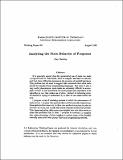| dc.contributor.author | Bawden, Alan | |
| dc.date.accessioned | 2008-04-28T14:14:01Z | |
| dc.date.available | 2008-04-28T14:14:01Z | |
| dc.date.issued | 1988-08 | |
| dc.identifier.uri | http://hdl.handle.net/1721.1/41478 | |
| dc.description.abstract | It is generally agreed that the unrestricted use of state can make a program hard to understand, hard to compile, and hard to execute, and that these difficulties increase in the presence of parallel hardware. This problem has led some to suggest that constructs that allow state should be banished from programming languages. But state is also a very useful phenomenon: some tasks are extremely difficult to accomplish without it, and sometimes the most perspicuous expression of an algorithm is one that makes use of state. Instead of outlawing state, we should be trying to understand it, so that we can make better use of it.
I propose a way of modeling systems in which the phenomenon of state occurs. I propose that systems that exhibit state-like behavior are those systems that must rely on their own nonlocal structure in order to function correctly, and I make this notion of nonlocal structure precise. This characterization offers some new insights into why state seems to cause the problems that it does. I propose to construct a compiler that takes advantage of these insights to achieve some of the benefits normally associated with purely functional programming systems. | en |
| dc.description.sponsorship | MIT Artificial Intelligence Laboratory | en |
| dc.language.iso | en_US | en |
| dc.publisher | MIT Artificial Intelligence Laboratory | en |
| dc.relation.ispartofseries | MIT Artificial Intelligence Laboratory Working Papers, WP-311 | en |
| dc.title | Analyzing the State Behavior of Programs | en |
| dc.type | Working Paper | en |
